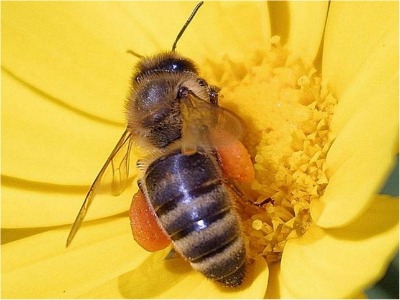Who of us hasn’t heard the phrase, “Busy as a Bee?” For the most part, if we keep busy, buzzing around like a Bee, it means we are productive, leading a full, meaningful life.
Well, as it turns out, Bees are very busy. They lead an industrious life filled with lots of responsibility. Yes, they are pests and some of us are allergic, but what they do is crucial to our existence. Their role is an essential ingredient needed in the development of our food chain. It’s safe to say, that without the Bee, we humans couldn’t survive.
Why?
Because without the Bee, we wouldn’t be able to pollinate our crops. Without the Bee we’d lose valuable foods that sustain our lives. You see, about one-third of the human diet comes from insect-pollinated plants, and the honeybee is responsible for 80 percent of that pollination.
So, to be honest, without the Bee…we are in deep doo-doo.
After 20 years of beekeeping, Tim Lovett, a public affairs director of the British Beekeepers Association, explains why bees are vital to our existence and why we need to care. “The more time you spend with bees, the more you get drawn into their amazing world: the way they organize themselves, control themselves, and what they’re responsible for.”
Just think. If there were no Bees, there wouldn’t be orange juice on our table. There’d be no jam, no honey. And that’s just for breakfast.
For the last several years, Beekeepers from around the world have noticed the dangers that Honeybees are facing. “I’ve been to China,” says Mr. Lovett, “where the bee population was wiped out, and you see men on ladders using paintbrushes to pollinate the fruit trees. Can you imagine the cost of our food if we had to do that ourselves? You’d only be able to afford half an olive on a pizza, and the mozzarella – which comes from cows raised on (bee-pollinated) alfalfa – would be absolutely prohibitive.”
Okay, I can do the math. No olives + No mozzarella = No pizza!
Say what? Ouch! That stings!
Here’s an interesting tidbit. Hubby and I were watching a documentary on the decline of the Bee population in the United States. It chronicled the typical life of a Bee and the business of Beekeeping. We watched as a Beekeeper traveled cross country from Georgia to central California to transport his hives where they’re needed to pollinate Almond groves, one of the largest crops grown in the state.
Then, after the bees finish doing what bees naturally do, they were brought back to the east coast in order to prepare them for their next job in Florida. But…they are not allowed to directly pollinate the next crop.
Why?
Apparently, as the Bee pollinates, they absorb the release of nectar to take back to the hive in order to produce honey. But…they’ve found that after the Bees have ingested the insecticide laden nectar from their last job, they need to detox the Bees before taking them to the next valuable food crop for pollination.
Detox the Bees? Have you ever?
Yes, I know. These poor little Bees cannot get rid of all the toxic insecticide they absorb from the heavily sprayed California Almond fields. The Beekeeper is forced to take them to another field to pollinate first, thus leaving behind the excess insecticide before being taken to the next job or else there’s a greater chance they will release the leftover toxins and pollute the next vital food crop.
Iy, yi, yi! Do you see a problem here? Or is it just me?
“It’s not a simple situation. If it were one factor we would have identified it by now,” President-elect Inouye, of the Ecological Society of America said. “The problems in Europe and United States may be slightly different. In America, bee hives are trucked from farm to farm to pollinate large tracts of land and that may help spread the parasites and disease, as well as add stress to the colonies, while in Europe they stay put so those issues may not be as big a factor.”
So, even though there are many factors that weigh in on the demise of our Bee population, I think there is something positive that we can all take away from this.
And that is…Detox.
Yes, detox.
Think about it. In order for the Bee to do its job well, it needs to rid itself of the toxins it’s ingested. I mean, if Bees do it, why shouldn’t we do it?
What? You thought this was going to be a Birds and the Bees post?
Ha, ha, ha, gotcha!
So what do you think? Are you concerned about the blight of the Bees? Have you been feeling a little bogged down lately? Feeling a little more tired than usual? Not producing like you think you should? Then perhaps it’s time for a detox. What is your favorite recipe for a great pick-me-up?
Thanks everyone for coming by and for all your wonderful comments!
Karen
